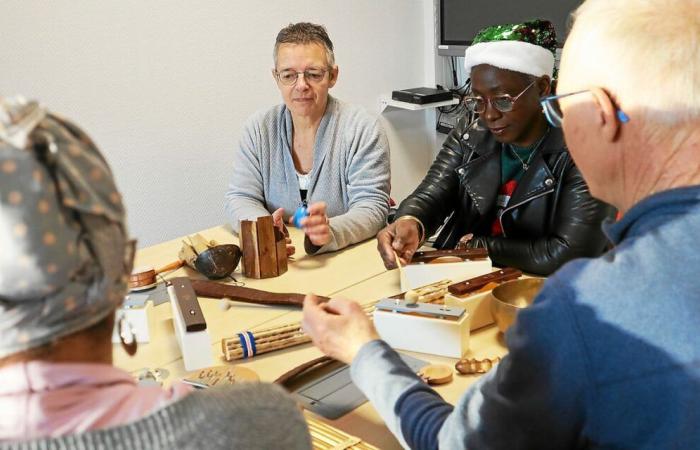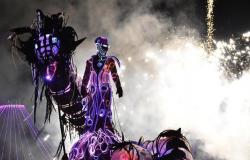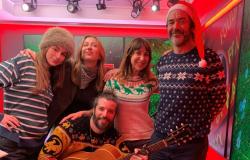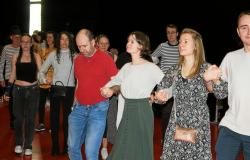“It’s our bubble.” Roger*, 70 years old, Sabrina*, 36 years old, and Adèle, 51 years old, meet every Thursday morning, at 9 a.m., in a room in the oncology department of Quimper hospital. This small group, which is missing a fourth person who was absent this Thursday, December 19, is participating in a cycle of 12 Music therapy sessions orchestrated by Cécile Fourage. Here, instruments replace words, and music becomes a means of healing in a different way.
A timeless parenthesis
The objective of these sessions is clear: to offer a bubble of respite and sharing, far from the weight of the illness. “The illness isolates, but here, we find each other. Music becomes a means of expression that goes beyond words,” explains Cécile Fourage, music therapist.
Each session follows a well-established structure that combines progression and kindness. From the start, the soothing notes of the harp immerse participants in a comforting atmosphere. This introductory moment is followed by an exchange where everyone gives their news. “It’s a moment for yourself. We listen to each other and we share,” confides Sabrina.
Then comes the warm-up: a few joint exercises and simple movements to relax the body and mind, and put yourself in your “bubble”. “This allows you to make yourself available for the future,” specifies the specialist.
When sound becomes language
The heart of the session lies in rhythmic exercises and sound improvisations, where participants freely explore the possibilities of the instruments. No need to be a musician: here, everything is based on listening and feeling. “We are not trying to play in tune, but to connect together,” emphasizes the music therapist. Tambourines, kalimbas, Tibetan bowls, maracas… Each instrument becomes a gateway to unsuspected emotions. “We fumble around, and then suddenly, we understand each other without speaking. It’s magical,” says Roger, adding: “We travel! “.
These moments of collective creation are followed by a moment of exchange, where everyone puts their experience into words. “It works on the memory, but also on the emotions. We learn to listen and verbalize what we feel,” explains Cécile Fourage.
The session ends with a final musical listening session, chosen by their music therapist, a soothing conclusion to this timeless interlude.
By their fifth session, participants already feel the benefits of these sessions: better concentration, newfound self-confidence and positive energy to face everyday challenges. “Here, we are not sick people. We are individuals who create, who share,” says Adèle, summarizing the spirit of these meetings.
And after?
As the cycle ends in February, the question of what comes next arises. “These sessions create a strong dynamic, and it is important to think about a follow-up so as not to stop everything suddenly,” explains Cécile. The participants hope to extend this experience, in one way or another.
In this space where music takes precedence over words, everyone finds a means of expression, relief, and a new way of living with illness. As Roger says so well: “Here, we forget about illness”.






